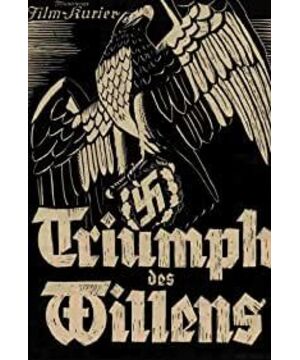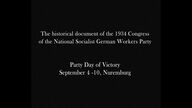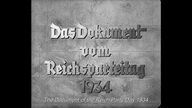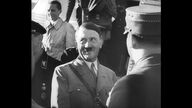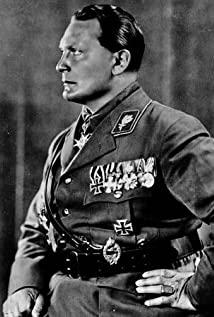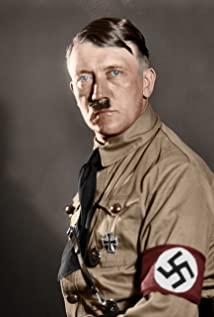If there is any female director in history that you admire, my answer is undoubtedly "Lenny Riefenstahl". In 1934, at the age of 32, Leini was invited by the then German Chancellor Adolf Hitler to Nuremberg to shoot a documentary for the National Socialist Party Annual Meeting, titled "Triumph of the Will". It was this film that completely changed the way of filming in documentaries, and to a certain extent also influenced the history of Germany and even the world. It is no exaggeration to say so.
In fact, long before the filming of this film, Lenny was already a smash hit "Mountain Film" actor and director, and it happened that the "Blu-ray" she directed completely conquered the world-renowned German in the eyes of all Germans. Unparalleled great leader! Since then, Lenny and the National Socialist Party have forged an indissoluble bond. But one thing should be for sure: Laney is definitely not a Nazi supporter, she is just passionately in love with the art she has been pursuing all her life. As evidenced by her agreement with the Fuhrer, she has since stopped filming any propaganda films. But Laney is such a good director, and when she agreed to make the film, she was destined to produce an unparalleled masterpiece. When Lenny arrived in Nuremberg with unrestricted funds and a 100-person camera crew and other luxurious filming elements, history changed quietly.
There is a point of view that 1935 was the peak period of the National Socialist Party. I can’t help but ask questions here. Even if a political party that has just been in power for only three years, even if its ability is great, it is difficult to be called the peak. The Northern Expedition led the way for Europa, but in 1935, Germany was just a defeated country under the control of Britain and France. If it weren't for France's too weak "appeasement policy", perhaps such a "thousand-autumn empire" would collapse in an instant. You must know that the National Socialist Party in 1935 was at a delicate watershed. In the past year of the cruel "Night of the Long Knife", the grief brought by the death of Marshal Hindenburg still could not be dissipated. It was Britain and France who came to their senses, and Germany may face a longer and more painful "defeat period". Because of this, Hitler, who had long been familiar with the cruelty of the political arena, naturally understood how important it was to restore people's hearts and minds, which is why he asked "Lenny" to shoot this film regardless of losses. So is the result exactly what the "Führer" wants?
The answer is yes. After the film was released, it not only received a warm response at home, but also won quite a lot internationally: the 1935 Venice Film Festival and the Paris Film Festival Best Documentary Award became Lenny's bag. If it is not convincing enough to be awarded by Venice, Italy, it is more triumphant to be awarded in Paris. Even today in the 20th century, this film is well known to documentarians all over the world, and even some countries are still intimidated by it and dare not release it. But good works will still be remembered no matter what label they are labeled. People call it "magic", even if you're not into politics, you can't help but be infected by it, is that true?
The Imperial Eagle at the beginning of the film and the introduction of the title are ignored. Even at the beginning of the film, you can feel the good intentions of the production team, what a meaningful title! "20 years after the World War, 16 years after the German suffering , the 19th month of renaissance." This is a clear indication of how much humiliation and suffering Germany has experienced after the war, and friends who know a little about history will not forget it, and it is even more impossible for the German people sitting in the theater to watch the movie. , this is the best way to mobilize emotions, to revive, to revenge! So who led Germany to revival? There is no doubt that Adolf Hitler, the language of the next camera lens also made it clear, a year later, the Führer came again Nuremberg, to commemorate the convening of the party congress. The audience at this time is bound to look forward to the heroic appearance of the head of state on the screen, but "Lenny" understands that it is not yet time, so it is a long long shot, showing nothing more than the sky, the city, and the country that can be seen everywhere. The Socialist Party flag, when the camera slowly approached the street and the crowd, we saw a long parade, and the familiar "Song of Horst Wiesel" sounded, the crowd boiled, and people knew that the Führer was coming. . But when he got off the plane, you couldn't hold back your emotions. When the foreshadowing was enough, even without any words, you would be emotionally overwhelmed. People have been looking forward to it for a long time, and so are the audience. Although many people were already excited for the appearance of the Führer, the actual climax has yet to come. The close-up of the back echoes the cheering crowd, whose faces are filled with happiness and contentment, as are the solemn soldiers, although There is no language, but it is moving enough, it seems that his appearance is expected.
As the head of state entered the hotel, the climax of the first paragraph seemed to come to an end, but what followed was a bonfire rally at night. The stormtroopers singing songs and the excited people played a symphony of national rise together, it seemed. This nation is always full of vigor and strength.
Some details are also worth noting. Nuremberg in the mist doesn't seem to wake up, but when the ubiquitous party flags are combined with this beautiful scene, the scenery is full of power, like the people in the city.
After a period of silence is the record of the Youth League. What else can I say? Vibrant, radiant, etc., you can't imagine that these are children who were displaced in the economic crisis not long ago and suffered from hunger and cold. We may not feel it, but Every member of the public who watched the film was a personal experiencer. It can be said that this record is of special significance, followed by the cordial reception of the head of state to the people from all walks of life, echoing the beginning and the end, making people sincerely admire this leader. So far, the purpose of "Lenny" has been basically achieved, and in every respect it is unparalleled.
The subsequent party congress lacked some technical content. It was like a bitter political reading meeting, but it was a way to make the audience worship the head of state more. After all, the speeches of these politicians are hard to match the head of state. Therefore, when recording, "Lenny" also deliberately accelerated the rhythm, in order to secretly transmit this kind of thought to the audience.
When people were fed up with the bitter speeches of the politicians, the Fuhrer also lost no time in appearing in the picture, and the first speech began at the review ceremony of the labor team, picking up the most inspiring words , such as there is no labor discrimination, and the Germans are equal. These words are the most moving! Coupled with that special voice, I believe that the German people must think they have seen the true God. Later speeches of the Youth League also used this technique, and he was a genius, constantly deifying the political leader.
The scenes that have appeared since then are shocking and grand enough to be called the world's No. 1 political movement. Whether it is the world-famous "flag ocean" or the "candlelight stadium" built with great money, it is shocking and dreamlike. Like a fantasy, the head of state's speech came as scheduled, and it was once again sanctified. After that, the Hindenburg funeral or the SS military parade are all similar in purpose. The long speech at the end is the finale. Completely conquer everything, fight! Fight! These words are repeated in the speech, and finally the film ends with "Germany" Long live" and the strong echo of the song "Horst Wiesel".
It is worth mentioning that "The Song of Horst Wiesel" seems to appear three times in the film, the pick-up procession, the funeral of Hindenburg, and the end of the final speech. You must know that this song is full of hatred and fighting. This is a silent oath. When the people sing this song in unison in the theater, it means that the German people swear that they will follow the Führer to the abyss of war.
This is a movie made by genius, but the effect it produces is extremely negative, and sometimes things are so extreme that when we admire Riefenstahl, we can't help but be recorded in that film" Qianqiu Empire” felt puzzled and regretful.
View more about The Triumph of the Will reviews


